Frozen Meat Market
Frozen Meat Market Size and Share Forecast Outlook 2025 to 2035
Frozen meat market is projected to grow from USD 29.8 billion in 2025 to USD 47.2 billion by 2035, at a CAGR of 4.7%. Beef will dominate with a 42.3% market share, while retail will lead the application segment with a 67.8% share.
Frozen Meat Market Forecast and Outlook 2025 to 2035
The global frozen meat market is valued at USD 29.8 billion in 2025 and is slated to reach USD 47.2 billion by 2035, recording an absolute increase of USD 17.4 billion over the forecast period. This translates into a total growth of 58.4%, with the market forecast to expand at a CAGR of 4.7% between 2025 and 2035.
The overall market size is expected to grow by approximately 1.58 times during the same period, supported by increasing consumer demand for convenience food products, growing adoption of frozen preservation technologies across global food processing industries, and rising preference for extended shelf-life protein solutions across retail and foodservice applications.
Quick Stats for Frozen Meat Market
- Frozen Meat Market Value (2025): USD 29.8 billion
- Frozen Meat Market Forecast Value (2035): USD 47.2 billion
- Frozen Meat Market Forecast CAGR: 4.7%
- Leading Type in Frozen Meat Market: Beef (42.3%)
- Key Growth Regions in Frozen Meat Market: North America, Asia Pacific, Europe
- Key Players in Frozen Meat Market: JBS S.A., Tyson Foods Inc., Cargill Inc., Hormel Foods Corporation, BRF S.A., Marfrig Global Foods S.A.
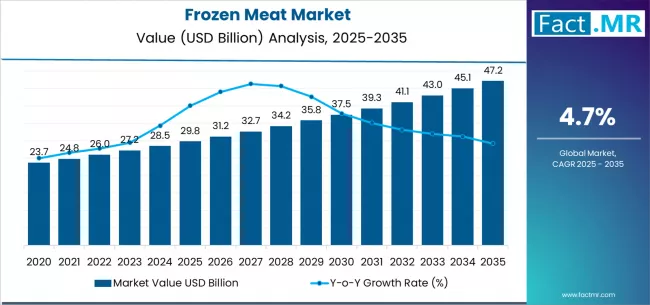
The frozen meat market represents a specialized segment of the global protein industry, characterized by technological advancement and robust demand across food processing and distribution channels. Market dynamics are influenced by changing consumer preferences toward convenient meal preparation, growing interest in food preservation technologies, and expanding partnerships between meat processors and cold chain logistics companies in developed and emerging economies. Traditional fresh meat systems continue evolving as food manufacturers seek proven frozen alternatives that offer enhanced storage flexibility and reliable supply chain management.
Consumer behavior in the frozen meat market reflects broader food trends toward high-performance, preservation-resistant systems that provide both convenience benefits and extended product availability. The market benefits from the growing popularity of standard beef applications, which are recognized for their advanced protein quality integration and user-friendly approach to meal preparation management. The versatility of frozen meat as both standalone protein products and integrated meal components supports demand across multiple product applications and price segments.
Regional adoption patterns vary significantly, with Asian markets showing strong preference for poultry implementations, while North American markets demonstrate increasing adoption of beef-grade solutions alongside conventional pork processing systems. The food landscape continues to evolve with sophisticated and feature-rich frozen products gaining traction in mainstream retail brands, reflecting manufacturer willingness to invest in proven preservation technology improvements and consumer-oriented features.
The competitive environment features established meat processing companies alongside specialized frozen food providers that focus on unique formulation capabilities and advanced freezing methods. Manufacturing efficiency and product development optimization remain critical factors for market participants, particularly as raw material costs and regulatory compliance continue to fluctuate. Distribution strategies increasingly emphasize multi-channel approaches that combine traditional retail supply chains with direct manufacturer partnerships through foodservice contracts and system integration agreements.
Market consolidation trends indicate that larger food processing manufacturers are acquiring specialty frozen meat companies to diversify their product portfolios and access specialized protein processing segments. Original equipment integration has gained momentum as food manufacturers seek to differentiate their offerings while maintaining competitive cost structures. The emergence of specialized preservation variants, including quick-frozen and industrial-grade options, reflects changing food priorities and creates new market opportunities for innovative frozen food system developers. Manufacturing automation and quality control improvements enable consistent product scaling while maintaining traditional protein characteristics that brand owners expect from established food materials.
Between 2025 and 2030, the frozen meat market is projected to expand from USD 29.8 billion to USD 37.1 billion, resulting in a value increase of USD 7.3 million, which represents 42.0% of the total forecast growth for the decade. This phase of development will be shaped by increasing adoption of poultry systems, rising demand for foodservice solutions, and growing focus on product convenience features with enhanced preservation characteristics. Food manufacturers are expanding their processing capabilities to address the growing demand for specialized frozen implementations, advanced protein options, and brand-specific offerings across product segments.
Frozen Meat Market Key Takeaways
| Metric | Value |
|---|---|
| Estimated Value (2025E) | USD 29.8 billion |
| Forecast Value (2035F) | USD 47.2 billion |
| Forecast CAGR (2025-2035) | 4.70% |
From 2030 to 2035, the market is forecast to grow from USD 37.1 billion to USD 47.2 billion, adding another USD 10.1 billion, which constitutes 58.0% of the overall ten-year expansion. This period is expected to be characterized by the expansion of foodservice systems, the integration of innovative preservation solutions, and the development of specialized protein implementations with enhanced quality profiles and extended performance capabilities. The growing adoption of advanced formulations will drive demand for frozen meat with superior cold-chain characteristics and compatibility with modern food distribution technologies across retail operations.
Between 2020 and 2025, the market experienced steady growth, driven by increasing demand for beef systems and growing recognition of preservation coatings as essential components for modern food convenience programs across retail and foodservice applications. The market developed as food manufacturers recognized the potential for frozen solutions to provide both protein quality benefits and operational advantages while enabling streamlined distribution protocols. Technological advancement in preservation chemistry and application-based development began focusing the critical importance of maintaining product performance and consumer acceptance in diverse food environments.
Why is the Frozen Meat Market Growing?
Market expansion is being supported by the increasing global demand for advanced food convenience systems and the corresponding need for protein technologies that can provide superior preservation benefits and quality advantages while enabling enhanced meal preparation and extended compatibility across various retail and foodservice applications. Modern food processors and food industry specialists are increasingly focused on implementing proven preservation technologies that can deliver effective cold-chain management, minimize traditional spoilage dependency, and provide consistent performance throughout complex distribution configurations and diverse storage conditions. Frozen meat proven ability to deliver exceptional preservation efficacy against traditional alternatives, enable advanced distribution integration, and support modern food convenience protocols makes it an essential component for contemporary food and meal preparation operations.
The growing focus on food convenience and distribution efficiency optimization is driving demand for frozen meat that can support large-scale processing requirements, improve quality outcomes, and enable advanced food systems. Consumer preference for products that combine effective preservation with proven protein quality and convenience benefits is creating opportunities for innovative frozen implementations. The rising influence of meal preparation trends and food performance awareness is also contributing to increased demand for frozen meat that can provide advanced features, seamless product integration, and reliable performance across extended storage periods.
Opportunity Pathways - Frozen Meat Market
The frozen meat market is poised for steady growth and technological advancement. As food manufacturers across North America, Europe, Asia-Pacific, and emerging markets seek systems that deliver exceptional protein quality, advanced preservation capabilities, and reliable performance options, frozen meat solutions are gaining prominence not just as protein products but as strategic enablers of food technologies and advanced meal functionality.
Rising poultry adoption in Asia-Pacific and expanding foodservice initiatives globally amplify demand, while manufacturers are leveraging innovations in preservation engineering, advanced formulation integration, and quality management technologies.
Pathways like foodservice implementations, retail-grade platforms, and specialized convenience solutions promise strong margin uplift, especially in premium product segments. Geographic expansion and product diversification will capture volume, particularly where local food preferences and advanced technology adoption are critical. Regulatory support around food safety standards, preservation efficacy protocols, and protein quality requirements give structural support.
- Pathway A - Poultry Implementations. Premium food manufacturers and specialty retail producers increasingly require frozen meat solutions with poultry technology and advanced protein profiles for enhanced product appeal and premium positioning capabilities. Technology developers who develop poultry platforms with superior preservation standards can command premium pricing. Expected revenue pool: USD 6.8 billion - USD 9.4 billion.
- Pathway B - Foodservice Platforms. Growing demand for foodservice applications, high-volume processing capabilities, and unique convenience features drives need for advanced foodservice capabilities with specialized distribution integration. Opportunity: USD 5.9 billion - USD 8.2 billion.
- Pathway C - Specialized Retail Applications. Advanced retail formulations capable of meeting specific consumer requirements, product compatibility, and specialized convenience profiles enable market expansion and enhanced shelf appeal for retail-focused manufacturers. Revenue lift: USD 5.5 billion - USD 7.6 billion.
- Pathway D - Convenience Integration Applications. Expanding reach into meal preparation platforms with optimized protein delivery, advanced preservation capabilities, and extended functionality features. Manufacturers will seek partners who supply integrated convenience solutions with complete meal functionality. Pool: USD 6.2 billion - USD 8.6 billion.
- Pathway E - Geographic Expansion & Local Manufacturing. Strong growth in APAC, particularly China, India, and Southeast Asia. Local manufacturing lowers costs, reduces supply complexity, and enables faster response to regional food preferences. Expected upside: USD 7.2 billion - USD 10.0 billion.
- Pathway F - Brand Partnership Development. Increasing demand for custom formulations, brand-specific functionality, and specialized protein profiles with validated preservation characteristics for food processing companies. USD 4.6 million - USD 6.3 billion.
- Pathway G - Retail Expansion. Developing comprehensive retail solutions, display compatibility services, and enhancement programs creates differentiation and addresses specialized requirements for retail providers and brand owners. Growing demand from independent food services. Pool: USD 4.1 billion - USD 5.7 billion.
Segmental Analysis
How do the beef type and retail application segments dominate the frozen meat market?
The market is segmented by type, application, end user, processing method, packaging format, distribution channel, price range, and region. By type, the market is divided into beef, poultry, pork, and other meat categories. By application, it covers retail, foodservice, processing, and others segments. By end user, it encompasses households, restaurants, food processors, and institutional buyers. By processing method, the market includes individually quick frozen (IQF), block frozen, and blast frozen. By packaging format, the market is categorized into vacuum packed, tray packed, and bulk packaging categories. By distribution channel, the market is divided into supermarkets/hypermarkets, online retail, and specialty stores. By price range, the market includes premium, mid-range, and economy. Regionally, the market is divided into North America, Europe, East Asia, South Asia & Pacific, Latin America, and the Middle East & Africa.
By Type, the Beef Segment Accounts for 42.3% Market Share
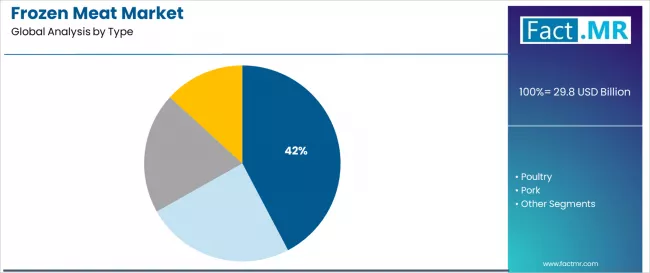
The beef segment is projected to account for 42.3% of the market in 2025, reaffirming its position as the leading type category. Food manufacturers and system integrators increasingly utilize beef implementations for their superior protein content when operating across diverse product platforms, excellent processing properties, and widespread acceptance in applications ranging from basic retail to premium foodservice operations. Beef technology's established processing methods and proven quality capabilities directly address the manufacturer requirements for dependable protein solutions in complex distribution environments.
This type segment forms the foundation of modern food adoption patterns, as it represents the implementation with the greatest market penetration and established consumer acceptance across multiple product categories and price segments. Manufacturer investments in beef standardization and system consistency continue to strengthen adoption among food producers and processing companies. With brands prioritizing protein quality and product versatility, beef implementations align with both functionality preferences and cost expectations, making them the central component of comprehensive meal preparation strategies.
By Application, the Retail Segment Accounts for 67.8% Market Share
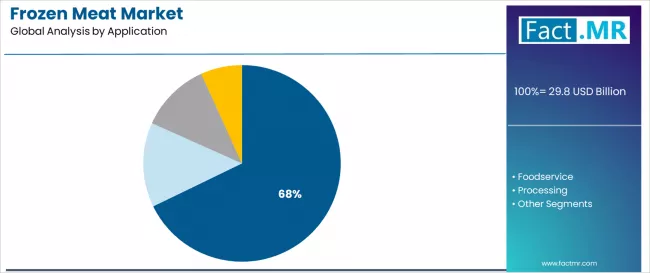
Retail applications are projected to represent 67.8% of frozen meat demand in 2025, highlighting their critical role as the primary application channel for protein distribution across food processing, retail operations, and consumer product applications. Food retailers prefer frozen meat for retail use for their exceptional preservation characteristics, scalable processing options, and ability to enhance product availability while ensuring consistent quality throughout diverse retail platforms and storage operations. Positioned as essential protein components for modern food distribution, frozen meat solutions offer both technological advantages and processing efficiency benefits.
The segment is supported by continuous innovation in retail technologies and the growing availability of specialized implementations that enable diverse consumer requirements with enhanced quality uniformity and extended shelf-life capabilities. The retailers are investing in advanced technologies to support large-scale distribution integration and product development. As food convenience trends become more prevalent and protein performance awareness increases, retail applications will continue to represent a major implementation market while supporting advanced food utilization and technology integration strategies.
What are the Drivers, Restraints, and Key Trends of the Frozen Meat Market?
The frozen meat market is advancing steadily due to increasing demand for advanced food convenience systems and growing adoption of protein technologies that provide superior preservation characteristics and quality benefits while enabling enhanced meal preparation across diverse retail and foodservice applications. The market faces challenges, including complex cold-chain requirements, evolving food regulations, and the need for specialized processing expertise and performance programs. Innovation in preservation chemistry and advanced freezing systems continues to influence product development and market expansion patterns.
Expansion of Food Convenience Technologies and Distribution Integration
The growing adoption of advanced food convenience, sophisticated quality management capabilities, and meal preparation awareness is enabling system developers to produce advanced frozen meat solutions with superior protein positioning, enhanced quality profiles, and seamless integration functionalities. Advanced food convenience systems provide improved meal outcomes while allowing more efficient food workflows and reliable performance across various product applications and environmental conditions. Developers are increasingly recognizing the competitive advantages of distribution integration capabilities for market differentiation and quality positioning.
Integration of Advanced Processing Methods and Quality Engineering
Modern frozen meat providers are incorporating advanced preservation technology, quality protocol integration, and sophisticated processing solutions to enhance product appeal, enable intelligent preservation features, and deliver value-added solutions to food customers. These technologies improve protein performance while enabling new market opportunities, including multi-layer systems, optimized surface treatments, and enhanced cold-chain characteristics. Advanced quality integration also allows developers to support comprehensive food technologies and market expansion beyond traditional protein approaches.
Analysis of the Frozen Meat Market by Key Countries
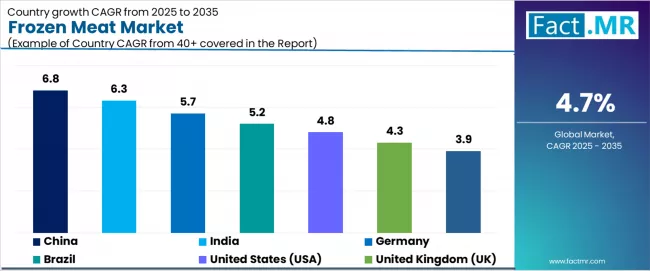
| Country | CAGR (2025-2035) |
|---|---|
| China | 6.8% |
| India | 6.3% |
| Germany | 5.7% |
| Brazil | 5.2% |
| United States (USA) | 4.8% |
| United Kingdom (UK) | 4.3% |
| Japan | 3.9% |
The market is experiencing steady growth globally, with China leading at a 6.8% CAGR through 2035, driven by expanding food processing capacity, growing retail modernization programs, and significant investment in protein development. India follows at 6.3%, supported by increasing food distribution expansion, growing retail technology integration patterns, and expanding consumer goods infrastructure. Germany shows growth at 5.7%, focusing food technology leadership and protein development. Brazil records 5.2%, focusing on expanding food processing capabilities and protein technology modernization. The USA exhibits 4.8% growth, focusing food innovation excellence and premium protein development. The UK demonstrates 4.3% growth, prioritizing advanced food technology development and meal preparation trends. Japan shows 3.9% growth, supported by food technology initiatives and quality-focused production patterns.
The report covers an in-depth analysis of 40+ countries, top-performing countries are highlighted below.
How is China leading global market growth through food processing expansion?
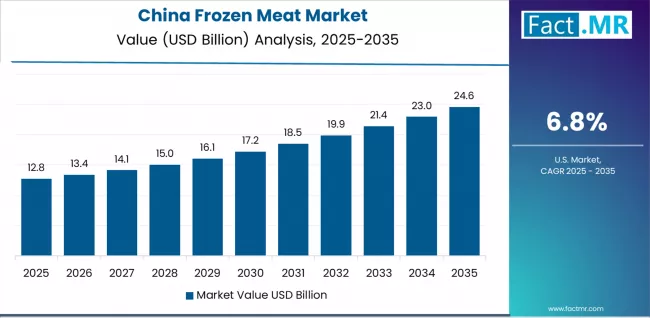
China is projected to exhibit robust growth with a CAGR of 6.8% through 2035, driven by expanding food processing capacity and rapidly growing retail integration supported by government initiatives promoting food technology development. The country's strong position in food production and increasing investment in cold-chain infrastructure are creating substantial demand for advanced frozen implementations. Major food processing manufacturers and technology companies are establishing comprehensive integration capabilities to serve both domestic retail demand and expanding export markets.
- Government support for food safety modernization initiatives and protein development is driving demand for advanced preservation systems throughout major processing regions and production centers across the country.
- Strong food processing growth and an expanding network of technology-focused producers are supporting the rapid adoption of frozen meat among manufacturers seeking advanced protein capabilities and integrated food technologies.
How is India demonstrating strong market potential through food distribution expansion?
India is expanding at a CAGR of 6.3%, supported by the country's growing food processing sector, expanding retail technology capacity, and increasing adoption of food convenience technologies. The country's initiatives promoting food safety modernization and growing retail development awareness are driving requirements for technology-integrated protein systems. International food providers and domestic processing companies are establishing extensive manufacturing and integration capabilities to address the growing demand for advanced convenience solutions.
- Rising food processing requirements and expanding retail programs are creating opportunities for frozen meat adoption across urban processing centers, progressive producers, and modern retail facilities in major consumer regions.
- Growing focus on meal preparation integration and convenience features is driving adoption of frozen platforms among food manufacturers seeking enhanced product capabilities and advanced protein experiences.
How is Germany demonstrating food industry leadership through technology growth?
Germany is expanding at a CAGR of 5.7%, supported by the country's food technology heritage, strong focus on meal preparation technology, and robust demand for advanced protein systems in food and retail applications. The nation's mature food sector and technology-focused operations are driving sophisticated frozen implementations throughout the processing industry. Leading manufacturers and food specialists are investing extensively in protein development and advanced integration technologies to serve both domestic and international markets.
- Rising demand for food technologies and advanced meal systems is creating requirements for sophisticated frozen meat solutions with exceptional protein capabilities among quality-conscious manufacturers seeking enhanced product experiences and advanced integration methods.
- Strong food tradition and growing investment in meal technologies are supporting adoption of quality frozen platforms with advanced development methods and enhanced protein profiles across food operations in major processing regions.
How is Brazil focusing on food processing and consumer goods distribution?
Brazil is growing at a CAGR of 5.2%, driven by the country's expanding food processing sector, growing consumer goods programs, and increasing investment in protein technology development. Brazil's large consumer market and commitment to food processing advancement are supporting demand for diverse frozen solutions across multiple product segments. Manufacturers are establishing comprehensive integration capabilities to serve the growing domestic market and expanding processing opportunities.
- Strong processing expansion and expanding modern food operations are driving adoption of integrated protein systems with superior quality capabilities and advanced integration among large food manufacturers and progressive processing producers.
- Growing technology diversity and increasing meal preparation adoption are supporting market expansion for advanced frozen implementations with seamless integration profiles and modern protein delivery throughout the country's processing regions.
How is the United States focusing advanced technology development and food innovation?
The USA is expanding at a CAGR of 4.8%, supported by the country's advanced food technology sector, strategic focus on meal preparation solutions, and established food processing capabilities. The USA's food innovation leadership and technology integration are driving demand for specialized frozen implementations in premium products, retail applications, and advanced food systems. Manufacturers are investing in comprehensive technology development to serve both domestic specialty markets and international quality applications.
- Meal preparation optimization and technology advancement are creating opportunities for specialized frozen adoption in food systems, convenience services, and technology-focused food operations among leading consumer goods enterprises.
- Growing focus on advanced protein delivery and meal features is driving adoption of quality frozen implementations with enhanced technology profiles and integrated quality management throughout the country's food technology sector.
How is the United Kingdom exhibiting food technology development and premium product growth?
The UK is growing at a CAGR of 4.3%, driven by the country's focus on food technology advancement, focus on premium product innovation, and strong position in meal development. The UK's established food innovation capabilities and commitment to technology diversification are supporting investment in specialized frozen technologies throughout major processing regions. Industry leaders are establishing comprehensive technology integration systems to serve domestic premium product production and food applications.
- Innovations in meal platforms and protein integration capabilities are creating demand for advanced frozen meat implementations with exceptional quality properties among progressive food manufacturers seeking enhanced technology differentiation and consumer appeal.
- Growing premium product adoption and increasing focus on food innovation are driving adoption of advanced frozen platforms with integrated protein delivery and processing optimization across food enterprises throughout the country.
How is Japan showcasing a quality food focus through technology-driven manufacturing?
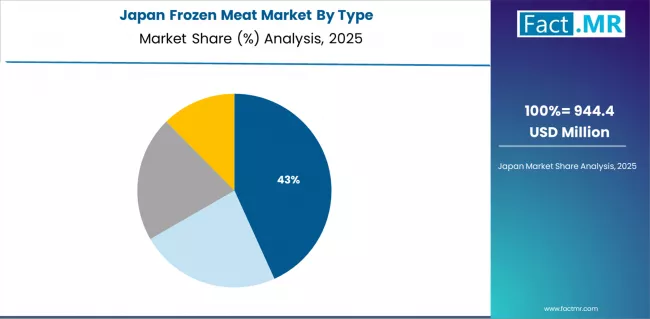
Japan is expanding at a CAGR of 3.9%, supported by the country's food excellence initiatives, growing quality technology sector, and strategic focus on advanced product development. Japan's advanced quality control capabilities and integrated food systems are driving demand for high-quality frozen platforms in premium products, food technology, and advanced meal applications. Leading manufacturers are investing in specialized capabilities to serve the stringent requirements of technology-focused food and premium product industries.
- Quality food advancement and technology-focused development are creating requirements for specialized frozen meat solutions with superior quality integration, exceptional protein capabilities, and advanced processing features among quality-conscious food operations and premium product manufacturers.
- Strong position in food technology innovation is supporting adoption of advanced frozen systems with validated protein characteristics and quality integration capabilities throughout the country's food technology sector.
Europe Market Split by Countries
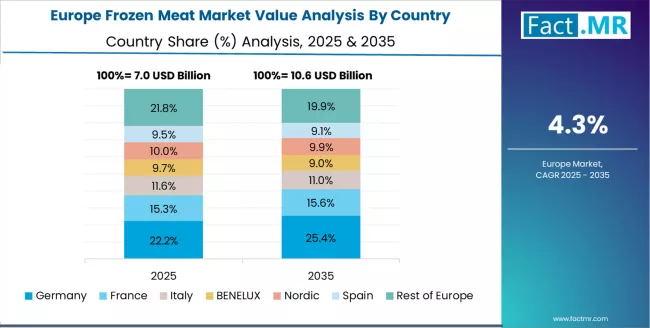
The frozen meat market in Europe is projected to grow from USD 8.5 billion in 2025 to USD 13.2 billion by 2035, registering a CAGR of 4.5% over the forecast period. Germany is expected to maintain its leadership position with a 38.7% market share in 2025, growing to 39.4% by 2035, supported by its strong food engineering culture, sophisticated food processing capabilities, and comprehensive food industry serving diverse frozen meat applications across Europe.
France follows with a 22.1% share in 2025, projected to reach 21.7% by 2035, driven by robust demand for food technologies in retail applications, advanced consumer goods programs, and foodservice markets, combined with established food processing infrastructure and technology integration expertise. The United Kingdom holds a 16.3% share in 2025, expected to reach 15.8% by 2035, supported by strong food technology sector and growing premium product activities. Italy commands a 12.8% share in 2025, projected to reach 12.4% by 2035, while Netherlands accounts for 6.9% in 2025, expected to reach 7.1% by 2035. Spain maintains a 2.7% share in 2025, growing to 2.9% by 2035. The Rest of Europe region, including Nordic countries, Eastern Europe, Belgium, Poland, and other nations, is anticipated to maintain momentum, with its collective share moving from 0.5% to 0.7% by 2035, attributed to increasing food modernization in Eastern Europe and growing technology penetration in Nordic countries implementing advanced meal preparation programs.
What is the competitive landscape of the frozen meat market?
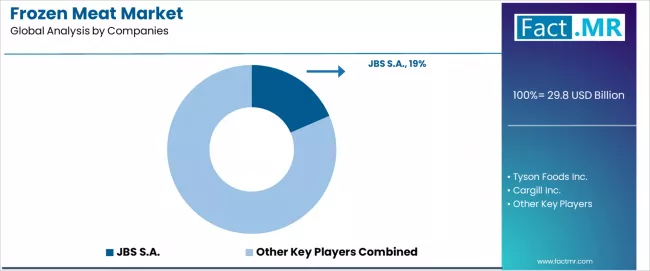
The market is characterized by competition among established meat processing companies, specialized frozen food developers, and integrated protein solution providers. Companies are investing in preservation chemistry research, processing optimization, advanced protein system development, and comprehensive food portfolios to deliver consistent, high-quality, and application-specific frozen meat solutions. Innovation in advanced protein integration, preservation enhancement, and food compatibility improvement is central to strengthening market position and competitive advantage.
JBS S.A. leads the market with a 18.5% market share, offering comprehensive protein solutions including quality meat platforms and advanced integration systems with a focus on premium and foodservice applications. Tyson Foods Inc. provides specialized processing capabilities with an focus on advanced frozen implementations and innovative food solutions. Cargill Inc. delivers comprehensive food services with a focus on integrated platforms and large-scale processing applications. Hormel Foods Corporation specializes in advanced protein technologies and specialized frozen implementations for premium applications. BRF S.A. focuses on consumer-oriented food integration and innovative technology solutions.
Key Players in the Frozen Meat Market
- JBS S.A.
- Tyson Foods Inc.
- Cargill Inc.
- Hormel Foods Corporation
- BRF S.A.
- Marfrig Global Foods S.A.
- Smithfield Foods
- ConAgra Brands Inc.
- Pilgrim's Pride Corporation
- WH Group Limited
- Kerry Group Plc
- Perdue Farms
- Sanderson Farms
- OSI Group
- National Beef Packing Company
Scope of the Report
| Item | Value |
|---|---|
| Quantitative Units | USD 29.8 billion |
| Type | Beef; Poultry; Pork; Other Meat |
| Application | Retail; Foodservice; Processing; Others |
| End User | Households; Restaurants; Food Processors; Institutional Buyers |
| Processing Method | Individually Quick Frozen (IQF); Block Frozen; Blast Frozen |
| Packaging Format | Vacuum Packed; Tray Packed; Bulk Packaging |
| Distribution Channel | Supermarkets/Hypermarkets; Online Retail; Specialty Stores |
| Price Segment | Premium; Mid-range; Economy |
| Regions Covered | North America; Europe; East Asia; South Asia & Pacific; Latin America; Middle East & Africa |
| Countries Covered | China; India; Germany; Brazil; United States; United Kingdom; Japan; France; and 40+ additional countries |
| Key Companies Profiled | JBS S.A.; Tyson Foods Inc.; Cargill Inc.; Hormel Foods Corporation; BRF S.A.; Marfrig Global Foods S.A. |
| Additional Attributes | Dollar sales by type and application category; regional demand trends; competitive landscape; technological advancements in preservation engineering; advanced formulation development; protein innovation; food integration protocols |
Frozen Meat Market by Segments
-
Type :
- Beef
- Poultry
- Pork
- Other Meat
-
Application :
- Retail
- Foodservice
- Processing
- Others
-
End User :
- Households
- Restaurants
- Food Processors
- Institutional Buyers
-
Processing Method :
- Individually Quick Frozen (IQF)
- Block Frozen
- Blast Frozen
-
Packaging Format :
- Vacuum Packed
- Tray Packed
- Bulk Packaging
-
Distribution Channel :
- Supermarkets/Hypermarkets
- Online Retail
- Specialty Stores
-
Price Segment :
- Premium
- Mid-range
- Economy
-
Region :
-
North America
- United States
- Canada
- Mexico
-
Europe
- Germany
- United Kingdom
- France
- Italy
- Spain
- Nordic
- BENELUX
- Rest of Europe
-
East Asia
- China
- Japan
- South Korea
-
South Asia & Pacific
- India
- ASEAN
- Australia & New Zealand
- Rest of South Asia & Pacific
-
Latin America
- Brazil
- Chile
- Argentina
- Rest of Latin America
-
Middle East & Africa
- Kingdom of Saudi Arabia
- Other GCC Countries
- Turkiye
- South Africa
- Other African Union
- Rest of Middle East & Africa
-
Table of Content
- Executive Summary
- Global Market Outlook
- Demand to side Trends
- Supply to side Trends
- Technology Roadmap Analysis
- Analysis and Recommendations
- Market Overview
- Market Coverage / Taxonomy
- Market Definition / Scope / Limitations
- Market Background
- Market Dynamics
- Drivers
- Restraints
- Opportunity
- Trends
- Scenario Forecast
- Demand in Optimistic Scenario
- Demand in Likely Scenario
- Demand in Conservative Scenario
- Opportunity Map Analysis
- Product Life Cycle Analysis
- Supply Chain Analysis
- Investment Feasibility Matrix
- Value Chain Analysis
- PESTLE and Porter’s Analysis
- Regulatory Landscape
- Regional Parent Market Outlook
- Production and Consumption Statistics
- Import and Export Statistics
- Market Dynamics
- Global Market Analysis 2020 to 2024 and Forecast, 2025 to 2035
- Historical Market Size Value (USD Million) Analysis, 2020 to 2024
- Current and Future Market Size Value (USD Million) Projections, 2025 to 2035
- Y to o to Y Growth Trend Analysis
- Absolute $ Opportunity Analysis
- Global Market Pricing Analysis 2020 to 2024 and Forecast 2025 to 2035
- Global Market Analysis 2020 to 2024 and Forecast 2025 to 2035, By Type
- Introduction / Key Findings
- Historical Market Size Value (USD Million) Analysis By Type, 2020 to 2024
- Current and Future Market Size Value (USD Million) Analysis and Forecast By Type, 2025 to 2035
- Beef
- Poultry
- Pork
- Other Meat
- Y to o to Y Growth Trend Analysis By Type, 2020 to 2024
- Absolute $ Opportunity Analysis By Type, 2025 to 2035
- Global Market Analysis 2020 to 2024 and Forecast 2025 to 2035, By Application
- Introduction / Key Findings
- Historical Market Size Value (USD Million) Analysis By Application, 2020 to 2024
- Current and Future Market Size Value (USD Million) Analysis and Forecast By Application, 2025 to 2035
- Retail
- Foodservice
- Processing
- Others
- Y to o to Y Growth Trend Analysis By Application, 2020 to 2024
- Absolute $ Opportunity Analysis By Application, 2025 to 2035
- Global Market Analysis 2020 to 2024 and Forecast 2025 to 2035, By Region
- Introduction
- Historical Market Size Value (USD Million) Analysis By Region, 2020 to 2024
- Current Market Size Value (USD Million) Analysis and Forecast By Region, 2025 to 2035
- North America
- Latin America
- Western Europe
- Eastern Europe
- East Asia
- South Asia and Pacific
- Middle East & Africa
- Market Attractiveness Analysis By Region
- North America Market Analysis 2020 to 2024 and Forecast 2025 to 2035, By Country
- Historical Market Size Value (USD Million) Trend Analysis By Market Taxonomy, 2020 to 2024
- Market Size Value (USD Million) Forecast By Market Taxonomy, 2025 to 2035
- By Country
- USA
- Canada
- Mexico
- By Type
- By Application
- By Country
- Market Attractiveness Analysis
- By Country
- By Type
- By Application
- Key Takeaways
- Latin America Market Analysis 2020 to 2024 and Forecast 2025 to 2035, By Country
- Historical Market Size Value (USD Million) Trend Analysis By Market Taxonomy, 2020 to 2024
- Market Size Value (USD Million) Forecast By Market Taxonomy, 2025 to 2035
- By Country
- Brazil
- Chile
- Rest of Latin America
- By Type
- By Application
- By Country
- Market Attractiveness Analysis
- By Country
- By Type
- By Application
- Key Takeaways
- Western Europe Market Analysis 2020 to 2024 and Forecast 2025 to 2035, By Country
- Historical Market Size Value (USD Million) Trend Analysis By Market Taxonomy, 2020 to 2024
- Market Size Value (USD Million) Forecast By Market Taxonomy, 2025 to 2035
- By Country
- Germany
- UK
- Italy
- Spain
- France
- Nordic
- BENELUX
- Rest of Western Europe
- By Type
- By Application
- By Country
- Market Attractiveness Analysis
- By Country
- By Type
- By Application
- Key Takeaways
- Eastern Europe Market Analysis 2020 to 2024 and Forecast 2025 to 2035, By Country
- Historical Market Size Value (USD Million) Trend Analysis By Market Taxonomy, 2020 to 2024
- Market Size Value (USD Million) Forecast By Market Taxonomy, 2025 to 2035
- By Country
- Russia
- Poland
- Hungary
- Balkan & Baltic
- Rest of Eastern Europe
- By Type
- By Application
- By Country
- Market Attractiveness Analysis
- By Country
- By Type
- By Application
- Key Takeaways
- East Asia Market Analysis 2020 to 2024 and Forecast 2025 to 2035, By Country
- Historical Market Size Value (USD Million) Trend Analysis By Market Taxonomy, 2020 to 2024
- Market Size Value (USD Million) Forecast By Market Taxonomy, 2025 to 2035
- By Country
- China
- Japan
- South Korea
- By Type
- By Application
- By Country
- Market Attractiveness Analysis
- By Country
- By Type
- By Application
- Key Takeaways
- South Asia and Pacific Market Analysis 2020 to 2024 and Forecast 2025 to 2035, By Country
- Historical Market Size Value (USD Million) Trend Analysis By Market Taxonomy, 2020 to 2024
- Market Size Value (USD Million) Forecast By Market Taxonomy, 2025 to 2035
- By Country
- India
- ASEAN
- Australia & New Zealand
- Rest of South Asia and Pacific
- By Type
- By Application
- By Country
- Market Attractiveness Analysis
- By Country
- By Type
- By Application
- Key Takeaways
- Middle East & Africa Market Analysis 2020 to 2024 and Forecast 2025 to 2035, By Country
- Historical Market Size Value (USD Million) Trend Analysis By Market Taxonomy, 2020 to 2024
- Market Size Value (USD Million) Forecast By Market Taxonomy, 2025 to 2035
- By Country
- Kingdom of Saudi Arabia
- Other GCC Countries
- Turkiye
- South Africa
- Other African Union
- Rest of Middle East & Africa
- By Type
- By Application
- By Country
- Market Attractiveness Analysis
- By Country
- By Type
- By Application
- Key Takeaways
- Key Countries Market Analysis
- USA
- Pricing Analysis
- Market Share Analysis, 2024
- By Type
- By Application
- Canada
- Pricing Analysis
- Market Share Analysis, 2024
- By Type
- By Application
- Mexico
- Pricing Analysis
- Market Share Analysis, 2024
- By Type
- By Application
- Brazil
- Pricing Analysis
- Market Share Analysis, 2024
- By Type
- By Application
- Chile
- Pricing Analysis
- Market Share Analysis, 2024
- By Type
- By Application
- Germany
- Pricing Analysis
- Market Share Analysis, 2024
- By Type
- By Application
- UK
- Pricing Analysis
- Market Share Analysis, 2024
- By Type
- By Application
- Italy
- Pricing Analysis
- Market Share Analysis, 2024
- By Type
- By Application
- Spain
- Pricing Analysis
- Market Share Analysis, 2024
- By Type
- By Application
- France
- Pricing Analysis
- Market Share Analysis, 2024
- By Type
- By Application
- India
- Pricing Analysis
- Market Share Analysis, 2024
- By Type
- By Application
- ASEAN
- Pricing Analysis
- Market Share Analysis, 2024
- By Type
- By Application
- Australia & New Zealand
- Pricing Analysis
- Market Share Analysis, 2024
- By Type
- By Application
- China
- Pricing Analysis
- Market Share Analysis, 2024
- By Type
- By Application
- Japan
- Pricing Analysis
- Market Share Analysis, 2024
- By Type
- By Application
- South Korea
- Pricing Analysis
- Market Share Analysis, 2024
- By Type
- By Application
- Russia
- Pricing Analysis
- Market Share Analysis, 2024
- By Type
- By Application
- Poland
- Pricing Analysis
- Market Share Analysis, 2024
- By Type
- By Application
- Hungary
- Pricing Analysis
- Market Share Analysis, 2024
- By Type
- By Application
- Kingdom of Saudi Arabia
- Pricing Analysis
- Market Share Analysis, 2024
- By Type
- By Application
- Turkiye
- Pricing Analysis
- Market Share Analysis, 2024
- By Type
- By Application
- South Africa
- Pricing Analysis
- Market Share Analysis, 2024
- By Type
- By Application
- USA
- Market Structure Analysis
- Competition Dashboard
- Competition Benchmarking
- Market Share Analysis of Top Players
- By Regional
- By Type
- By Application
- Competition Analysis
- Competition Deep Dive
- JBS S.A.
- Overview
- Product Portfolio
- Profitability by Market Segments (Product/Age /Sales Channel/Region)
- Sales Footprint
- Strategy Overview
- Marketing Strategy
- Product Strategy
- Channel Strategy
- Tyson Foods Inc.
- Cargill Inc.
- Hormel Foods Corporation
- BRF S.A.
- Marfrig Global Foods S.A.
- Smithfield Foods
- ConAgra Brands Inc.
- Pilgrim's Pride Corporation
- WH Group Limited
- Kerry Group Plc
- Perdue Farms
- Sanderson Farms
- OSI Group
- National Beef Packing Company
- JBS S.A.
- Competition Deep Dive
- Assumptions & Acronyms Used
- Research Methodology
List Of Table
- Table 1: Global Market Value (USD Million) Forecast by Region, 2020 to 2035
- Table 2: Global Market Value (USD Million) Forecast by Type, 2020 to 2035
- Table 3: Global Market Value (USD Million) Forecast by Application, 2020 to 2035
- Table 4: North America Market Value (USD Million) Forecast by Country, 2020 to 2035
- Table 5: North America Market Value (USD Million) Forecast by Type, 2020 to 2035
- Table 6: North America Market Value (USD Million) Forecast by Application, 2020 to 2035
- Table 7: Latin America Market Value (USD Million) Forecast by Country, 2020 to 2035
- Table 8: Latin America Market Value (USD Million) Forecast by Type, 2020 to 2035
- Table 9: Latin America Market Value (USD Million) Forecast by Application, 2020 to 2035
- Table 10: Western Europe Market Value (USD Million) Forecast by Country, 2020 to 2035
- Table 11: Western Europe Market Value (USD Million) Forecast by Type, 2020 to 2035
- Table 12: Western Europe Market Value (USD Million) Forecast by Application, 2020 to 2035
- Table 13: Eastern Europe Market Value (USD Million) Forecast by Country, 2020 to 2035
- Table 14: Eastern Europe Market Value (USD Million) Forecast by Type, 2020 to 2035
- Table 15: Eastern Europe Market Value (USD Million) Forecast by Application, 2020 to 2035
- Table 16: East Asia Market Value (USD Million) Forecast by Country, 2020 to 2035
- Table 17: East Asia Market Value (USD Million) Forecast by Type, 2020 to 2035
- Table 18: East Asia Market Value (USD Million) Forecast by Application, 2020 to 2035
- Table 19: South Asia and Pacific Market Value (USD Million) Forecast by Country, 2020 to 2035
- Table 20: South Asia and Pacific Market Value (USD Million) Forecast by Type, 2020 to 2035
- Table 21: South Asia and Pacific Market Value (USD Million) Forecast by Application, 2020 to 2035
- Table 22: Middle East & Africa Market Value (USD Million) Forecast by Country, 2020 to 2035
- Table 23: Middle East & Africa Market Value (USD Million) Forecast by Type, 2020 to 2035
- Table 24: Middle East & Africa Market Value (USD Million) Forecast by Application, 2020 to 2035
List Of Figures
- Figure 1: Global Market Pricing Analysis
- Figure 2: Global Market Value (USD Million) Forecast 2020-2035
- Figure 3: Global Market Value Share and BPS Analysis by Type, 2025 and 2035
- Figure 4: Global Market Y to o to Y Growth Comparison by Type, 2025-2035
- Figure 5: Global Market Attractiveness Analysis by Type
- Figure 6: Global Market Value Share and BPS Analysis by Application, 2025 and 2035
- Figure 7: Global Market Y to o to Y Growth Comparison by Application, 2025-2035
- Figure 8: Global Market Attractiveness Analysis by Application
- Figure 9: Global Market Value (USD Million) Share and BPS Analysis by Region, 2025 and 2035
- Figure 10: Global Market Y to o to Y Growth Comparison by Region, 2025-2035
- Figure 11: Global Market Attractiveness Analysis by Region
- Figure 12: North America Market Incremental Dollar Opportunity, 2025-2035
- Figure 13: Latin America Market Incremental Dollar Opportunity, 2025-2035
- Figure 14: Western Europe Market Incremental Dollar Opportunity, 2025-2035
- Figure 15: Eastern Europe Market Incremental Dollar Opportunity, 2025-2035
- Figure 16: East Asia Market Incremental Dollar Opportunity, 2025-2035
- Figure 17: South Asia and Pacific Market Incremental Dollar Opportunity, 2025-2035
- Figure 18: Middle East & Africa Market Incremental Dollar Opportunity, 2025-2035
- Figure 19: North America Market Value Share and BPS Analysis by Country, 2025 and 2035
- Figure 20: North America Market Value Share and BPS Analysis by Type, 2025 and 2035
- Figure 21: North America Market Y to o to Y Growth Comparison by Type, 2025-2035
- Figure 22: North America Market Attractiveness Analysis by Type
- Figure 23: North America Market Value Share and BPS Analysis by Application, 2025 and 2035
- Figure 24: North America Market Y to o to Y Growth Comparison by Application, 2025-2035
- Figure 25: North America Market Attractiveness Analysis by Application
- Figure 26: Latin America Market Value Share and BPS Analysis by Country, 2025 and 2035
- Figure 27: Latin America Market Value Share and BPS Analysis by Type, 2025 and 2035
- Figure 28: Latin America Market Y to o to Y Growth Comparison by Type, 2025-2035
- Figure 29: Latin America Market Attractiveness Analysis by Type
- Figure 30: Latin America Market Value Share and BPS Analysis by Application, 2025 and 2035
- Figure 31: Latin America Market Y to o to Y Growth Comparison by Application, 2025-2035
- Figure 32: Latin America Market Attractiveness Analysis by Application
- Figure 33: Western Europe Market Value Share and BPS Analysis by Country, 2025 and 2035
- Figure 34: Western Europe Market Value Share and BPS Analysis by Type, 2025 and 2035
- Figure 35: Western Europe Market Y to o to Y Growth Comparison by Type, 2025-2035
- Figure 36: Western Europe Market Attractiveness Analysis by Type
- Figure 37: Western Europe Market Value Share and BPS Analysis by Application, 2025 and 2035
- Figure 38: Western Europe Market Y to o to Y Growth Comparison by Application, 2025-2035
- Figure 39: Western Europe Market Attractiveness Analysis by Application
- Figure 40: Eastern Europe Market Value Share and BPS Analysis by Country, 2025 and 2035
- Figure 41: Eastern Europe Market Value Share and BPS Analysis by Type, 2025 and 2035
- Figure 42: Eastern Europe Market Y to o to Y Growth Comparison by Type, 2025-2035
- Figure 43: Eastern Europe Market Attractiveness Analysis by Type
- Figure 44: Eastern Europe Market Value Share and BPS Analysis by Application, 2025 and 2035
- Figure 45: Eastern Europe Market Y to o to Y Growth Comparison by Application, 2025-2035
- Figure 46: Eastern Europe Market Attractiveness Analysis by Application
- Figure 47: East Asia Market Value Share and BPS Analysis by Country, 2025 and 2035
- Figure 48: East Asia Market Value Share and BPS Analysis by Type, 2025 and 2035
- Figure 49: East Asia Market Y to o to Y Growth Comparison by Type, 2025-2035
- Figure 50: East Asia Market Attractiveness Analysis by Type
- Figure 51: East Asia Market Value Share and BPS Analysis by Application, 2025 and 2035
- Figure 52: East Asia Market Y to o to Y Growth Comparison by Application, 2025-2035
- Figure 53: East Asia Market Attractiveness Analysis by Application
- Figure 54: South Asia and Pacific Market Value Share and BPS Analysis by Country, 2025 and 2035
- Figure 55: South Asia and Pacific Market Value Share and BPS Analysis by Type, 2025 and 2035
- Figure 56: South Asia and Pacific Market Y to o to Y Growth Comparison by Type, 2025-2035
- Figure 57: South Asia and Pacific Market Attractiveness Analysis by Type
- Figure 58: South Asia and Pacific Market Value Share and BPS Analysis by Application, 2025 and 2035
- Figure 59: South Asia and Pacific Market Y to o to Y Growth Comparison by Application, 2025-2035
- Figure 60: South Asia and Pacific Market Attractiveness Analysis by Application
- Figure 61: Middle East & Africa Market Value Share and BPS Analysis by Country, 2025 and 2035
- Figure 62: Middle East & Africa Market Value Share and BPS Analysis by Type, 2025 and 2035
- Figure 63: Middle East & Africa Market Y to o to Y Growth Comparison by Type, 2025-2035
- Figure 64: Middle East & Africa Market Attractiveness Analysis by Type
- Figure 65: Middle East & Africa Market Value Share and BPS Analysis by Application, 2025 and 2035
- Figure 66: Middle East & Africa Market Y to o to Y Growth Comparison by Application, 2025-2035
- Figure 67: Middle East & Africa Market Attractiveness Analysis by Application
- Figure 68: Global Market - Tier Structure Analysis
- Figure 69: Global Market - Company Share Analysis
- FAQs -
How big is the frozen meat market in 2025?
The global frozen meat market is estimated to be valued at USD 29.8 billion in 2025.
What will be the size of frozen meat market in 2035?
The market size for the frozen meat market is projected to reach USD 47.2 billion by 2035.
How much will be the frozen meat market growth between 2025 and 2035?
The frozen meat market is expected to grow at a 4.7% CAGR between 2025 and 2035.
What are the key product types in the frozen meat market?
The key product types in frozen meat market are beef, poultry, pork and other meat.
Which application segment to contribute significant share in the frozen meat market in 2025?
In terms of application, retail segment to command 67.8% share in the frozen meat market in 2025.